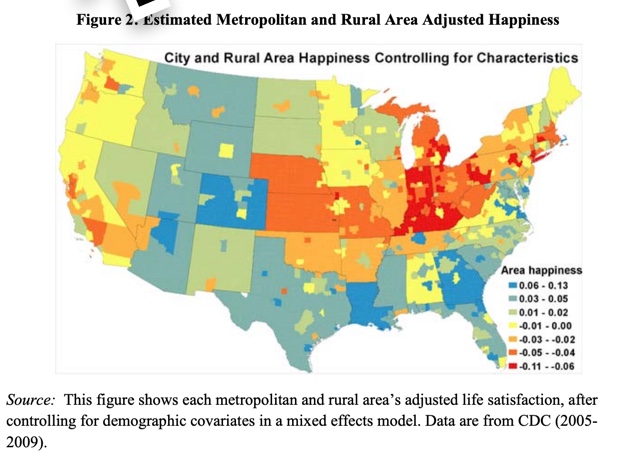The Happiest (and Unhappiest) Places to Retire in America
Category: Best Retirement Towns and States
Updated January 20, 2021 – Originally published August, 2014
Researchers from the National Bureau of Economic Research published a study of U.S. Unhappy Cities. The study also listed the cities that have the happiest people. While it is relatively easy to guess the unhappiest places, the cities with the happiest folks tend to be surprising. The study was not specifically about retirement, but we certainly think it is relevant.
But first – happy places…
Clyde, a long time Member and frequent contributor, brought this article back to our attention in connection with a fascinating piece he read in The New Yorker: “Find the Place You Love… Then Move There“. In it Arthur. C. Brooks talks about the notion that most people have a place they think of as home, no matter how many times they might move in their life. He says that although moving is a horrible and painful process, sometimes it is worth it if it brings you happiness. We couldn’t agree more when it comes to retirement. If where you are living doesn’t make you happy, find someplace that does and move there!
Happy Places
These are the top 6 metros with the happiest people according to the study. Kudos to the State of Louisiana, which has 2 out of the 6. Note that although 5 out of the 6 metros are in or close to the Sunbelt – what is going on in Rochester, Minn. to make folks so happy? (If the name appears in blue that link will take you to our city review).
– Charlottesville, Virginia
– Rochester, Minnesota
– Lafayette, Louisiana
– Naples, Florida
– Flagstaff, Arizona
– Shreveport, Louisiana
Unhappiest Places
There is a clear trend on the unhappy list; places in the Rust Belt bring up the bottom. New York, NY was a surprising addition as a very unhappy place. The addition of the Big Apple and its irrepressible citizens makes us think of our friend John, aka Chief Rain Cloud, when he describes his state of mind: “I’m not happy…unless I’m not happy”. After all, John is from Long Island.
– Gary, IN
– Pittsburgh, PA
– New York, NY
– South Bend, IN
– Erie, PA
– Scranton, PA
What does this all mean
The researchers from Harvard and the University of British Columbia studied the data from a host of angles in their attempt to understand why some cities have unhappier people than others. In the end they came up with relatively few answers. Sure, higher income people tend to be a bit happier, as do married vs. divorced folks. In the end they had one important conclusion: rust belt cities that have seen declining populations and economic well-being tend to be unhappier than places with healthier trends. And going back in time, those same mid-western industrial cities were unhappier years ago, which probably led to the reduced good fortune they have now.
Trying to explain why some places tend to have happy people and others the other way is difficult. In the end we think you can be happy wherever, and however you want!
The question
The CDC question interviewed and got responses from more than 1.5 million Americans between 2005 and 2010 on this question: “In general, how satisfied are you with your life”. There were 4 choices: Very satisfied, Satisfied, Unsatisfied, and Very Unsatisfied. A very satisfied response got 4 points, going down to 1 point for very unsatisfied. 45.7% of those overall said they were “very satisfied” with their lives.
The Happiness Map
This Map of the U.S. showing Happiest and Unhappiest Cities. Blue areas are the happiest, red are the unhappiest.

Comments? Do you live in a happy, or an unhappy place? What areas of the country seem to you to have the happiest folks? Does it even mean anything to you anyway? Please share your thoughts in the Comments section below.






Comments on "The Happiest (and Unhappiest) Places to Retire in America"
Paula says:
Interesting....but given that the data is 2005-09, when the Great Recession had hit (although I agree, Rust Belt was already affected before that), I don't find this particularly relevant at this point. Current economic trends would most likely be a better indicator, and life differs greatly depending on whether one is living in an urban area or rural. For example, life for many in Pittsburgh might be just great (given it's always now on some top list or other), but 40 miles outside the city, in a small dying former steel mill town, it's much much different. It's like readers of this blog asking about cost of living in a particular state. Where EXACTLY is one planning to move in that state? Even the "best budget cities" lists are considering only within that city's limits, and not taking in mind the cost of living in ritzy suburbs, where one might actually want to live. But, it's all good and interesting to read.
Dan says:
I agree with Paula. While the National Bureau of Economic Research may have just released this study, the data is 5-9 years old. The community I live in just outside of Washington, DC was built at the end of the baby-boomer era in the early 60's. Those who moved in back then are either retiring out or they're dying off. This changeover began about 10 years ago, and continues today. Unfortunately, this is the time-period when the economy tanked and the housing market was turned upside down. What was once a vibrant, thriving community as recent as 10 years ago is now a community of shut-ins, rental and vacant properties. I certainly wouldn't want to make a life-changing decision to move here based on data that was collected nearly 10 years ago. It's simply not the same community.
BTW - Has anyone else ever heard of the National Bureau of Economic Research? Is this a federal agency?
Kathy Hunter says:
From their website, nber.org: Founded in 1920, the National Bureau of Economic Research is a private, nonprofit, nonpartisan research organization dedicated to promoting a greater understanding of how the economy works. The NBER is committed to undertaking and disseminating unbiased economic research in a scientific manner, and without policy recommendations, among public policymakers, business professionals, and the academic community.
Nancy C says:
We currently live in Florida, supposedly a "happy place". This is not true. It is way too hot, horribly humid and the traffic is out of control. We are headed north to retire and will create our own "happy place". ..which is what it's all about anyway
SandyZ says:
I agree that the answer to the happiness question is very much based on exactly where in the state one lives. The economic differences throughout my state, Maine, are huge! Southern and Coastal Maine are in great shape economically speaking, but there is vast poverty and isolation in many of the distant rural areas of the state. To fully understand this data, more information is needed - we know the when, but season would also be interesting. Happiness in Maine in the summer is over the top, but ask us in winter - as in March!- when grumpiness and misery are prevalent and the happiness scale would drop to the bottom! I suspect that seasonal answers in Florida would also be quite different! Too many variables here for me to pay much attention.
Kathy says:
Pittsburgh will go to the happy side when the Steelers are at least a play-off team again.
Valerie says:
Yes, Kathy, let's hear it for the Black & Gold! However, Pittsburgh has a lot more going for itself other than being just a great city for sports fans with things like top notch medical and educational institutions, and cultural gems, such as the Pittsburgh Symphony, etc. But the greatest resource of all are the people of Pittsburgh. However, if the predictions of the 2015 Farmer's Almanac for this coming winter are anywhere as accurate as they were for the winter of 2014, then I may be heading for a warmer climate -- LOL!
Robert says:
I have been happy Rich and happy Poor = RICH IS MUCH BETTER.
Clyde says:
This article in Topretirements.com ran more than six years ago, but it’s always time to think about living or retiring in a place that makes you happy. It may not be where there are lots of “amenities” or where the weather is nice. Arthur Brooks, a contributor to the Atlantic Magazine just published an article suggesting we look at the personal happiness factor more in making decisions about where to live. It makes good sense. Worth reading through.
https://www.theatlantic.com/family/archive/2021/01/what-moving-house-can-do-your-happiness/617667/